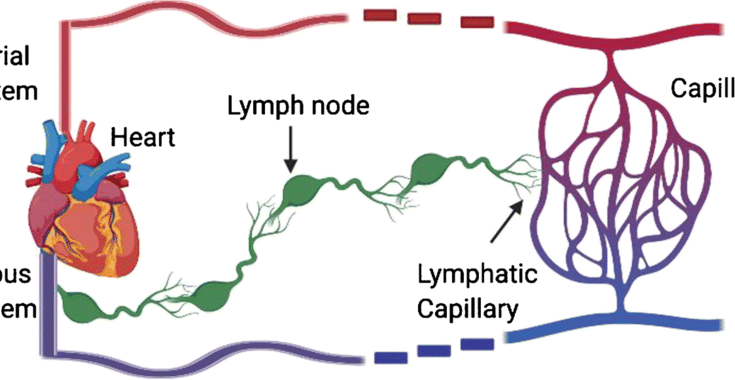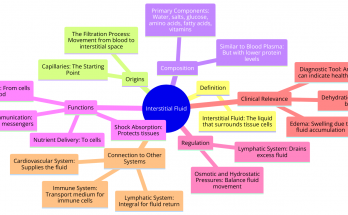Lymph is a clear fluid that flows throughout our body in a network of Vessels similar to blood Vessels. It is an essential part of our immune system and plays various important roles in our body. In this article we will discuss the 15 most important functions of Lymph.
Table of Contents
6 Important Roles of Lymph
Before we dive into the 15 functions, let’s first understand the six crucial roles of Lymph in Human body. They are as follows –
- Transportation- Lymph transports substances where blood Vessels do not reach.
- Nutrition- Lymph supplies nutrition and oxygen to those parts where blood cannot reach.
- Filtration- Lymph filters bacteria, foreign materials, toxins and any harmful materials.
- Drainage- Lymph drains away excess fluid to prevent water clogging of the tissues and cells.
- Absorption- Lymph absorbs fats from the intestine and transports them to the liver.
- Defence- Lymph produces WBCs, Lymphocytes and antibodies to protect and defend the body against infections.
15 Important Functions of Lymph – With Detailed Explanation
5 Important Functions of Lymph in Transportation
Transports digested and absorbed fats from the intestine and drains excess fluid from extracellular spaces back into the blood.
After we eat a meal, the fats in the food get broken down into small particles in our small intestine. These particles are then absorbed by the Lymphatic Vessels that carry them through Lymph nodes and into the bloodstream. The Lymphatic Vessels also help to drain excess fluid from the tissues and return it to the bloodstream, preventing swelling or edema.
Carries proteins back into the blood supply
Proteins are essential nutrients that our body needs to function properly. When proteins are broken down in the body some of the amino acids are transported by the Lymphatic Vessels. It transports them to the bloodstream where they can be used to build new proteins.
Absorbs some fluid from the digestive tract and passes proteins from circulation to tissues
The Lymphatic Vessels in the digestive tract help to absorb excess fluids and proteins from the intestines. This helps to regulate the fluid balance in the body and prevent dehydration. The Lymphatic Vessels also transport proteins from the blood to the tissues. Proteins are used for various functions like repairing damaged tissues.
Carries carbon dioxide and nitrogenous waste materials from tissues to the blood
As our cells perform various metabolic processes they produce waste materials such as carbon dioxide and nitrogenous waste. These waste products are transported by the Lymphatic Vessels to the bloodstream .Where they can be filtered and eliminated by the kidneys and lungs.
Supplies nutrition and oxygen to those parts where blood cannot reach
While blood Vessels carry nutrients and oxygen to most parts of the body . There are some areas like the cornea of the eye and the cartilage of joints where blood Vessels are absent or scarce. The Lymphatic Vessels help to supply these areas with the necessary nutrients and oxygen ensuring proper tissue function.
Also Check – Composition of the Lymph
2 Important Functions of Lymph in Nutrition
Absorbs fats from the intestine through Lymphatics (lacteals located in the intestinal villi)
Lymphatic Vessels in the small intestine, called Lacteals, play a crucial role in absorbing dietary fats. Fats get emulsified by bile and pancreatic enzymes, forming small droplets called micelles, when we eat a fat-containing meal in the small intestine. Lacteals in the intestinal villi take up these micelles and transport them through the Lymphatic system. Eventually, micelles enter the bloodstream, important for absorption of fat-soluble vitamins, such as vitamin A, D, E and K as they require fats for absorption.
Also Check – What is Lymphatic System
Carries the digested fat and passes proteins from circulation to tissues
In addition to absorbing fats from the intestine, the Lymphatic system also plays a role in transporting and distributing digested fats and proteins to various tissues throughout the body. The Lymphatic Vessels carry chylomicrons. Chylomicrons are particles that transport fats, as well as other lipids and proteins, from the intestine to the liver and other tissues. The Lymphatic system also help
Function of Lymph in Filtration
Lymph filters bacteria, foreign materials, toxins and any harmful materials.
The Lymphatic system plays an important role in filtering out harmful substances from the body. Lymph is a clear fluid that circulates throughout the Lymphatic Vessels and Lymph nodes. As Lymph flows through the Lymph nodes, specialised cells called Lymphocytes and macrophages filter out foreign particles, bacteria, viruses and other harmful substances. These cells identify and destroy pathogens and other harmful materials, helping to protect the body from infections and diseases.
Lymph also filters out excess fluids, proteins and metabolic waste products that are produced by cells in the body. This helps to maintain a healthy balance of fluids and electrolytes in the body and prevents the accumulation of harmful substances that could lead to tissue damage or organ failure.
2 Important Functions of Lymph in Drainage
Drains away excess fluid to prevent water clogging of the tissues and cells.
If the Lymphatic system is not functioning properly, excess fluid can accumulate in the tissues, leading to swelling and edema. The Lymphatic system helps to prevent this by removing excess fluid and maintaining a healthy balance of fluids in the body.
Drains away excess tissue fluid and metabolites and returns proteins to the blood from tissue spaces
Drains away excess tissue fluid and metabolites and returns proteins to the blood from tissue spaces- The Lymphatic system plays a crucial role in maintaining the balance of proteins and other nutrients in the body. Lymphatic Vessels collect excess proteins and other nutrients from the tissues and return them to the bloodstream for use by other parts of the body. This helps to ensure that all parts of the body receive the nutrients they need to function properly.
Also Check – 9 Important Functions of Blood
Functions of Lymph in Absorption
Fats from the intestine are absorbed through Lymphatics (lacteals located in the intestinal villi)
When we eat food, the fats are broken down into smaller molecules in the small intestine. These fat molecules cannot directly enter the bloodstream because they are not water-soluble. Instead, they are absorbed by specialized Lymphatic Vessels called lacteals that are located in the intestinal villi. The absorbed fats are then transported through the Lymphatic Vessels and eventually emptied into the bloodstream through the thoracic duct. This process of absorbing and transporting fats is essential for maintaining proper nutrition and energy balance in the body.
4 Functions of Lymph in Defense
Lymph nodes produce WBCs that prevent infection
Lymph nodes are small, bean-shaped structures that are distributed throughout the Lymphatic system. They contain specialised white blood cells, such as Lymphocytes and macrophages, that help to identify and destroy foreign substances that enter the body. These cells work together to produce an immune response that helps to prevent infection.
Produces Lymphocytes which protect and defend the body against infection
Lymphocytes are a type of white blood cell that play a key role in the immune system. There are two main types of Lymphocytes- B cells and T cells. B cells produce antibodies that can recognize and neutralise specific foreign substances in the body, while T cells help to identify and destroy infected or abnormal cells.
Produces antibodies to fight bacteria
Antibodies are proteins that are produced by B cells and help to fight against bacterial infections. They can recognize and bind to specific antigens (foreign substances) on the surface of bacteria, marking them for destruction by other immune cells.
Lymphocytes and monocytes of the Lymph function to defend the body
In addition to producing antibodies, Lymphocytes and other immune cells in the Lymphatic system also play a role in recognizing and destroying infected or abnormal cells in the body. For example, natural killer (NK) cells are a type of Lymphocyte that can identify and destroy cancerous or virus-infected cells. Monocytes, another type of white blood cell, can also help to defend the body by engulfing and destroying foreign substances.
Also Check – Human Circulatory System
Also Check – Difference between Lymph and Plasma
Also Check – 13 Important Differences between Lymph and Blood


10 Comments on “15 Important Functions of Lymph Class 10”